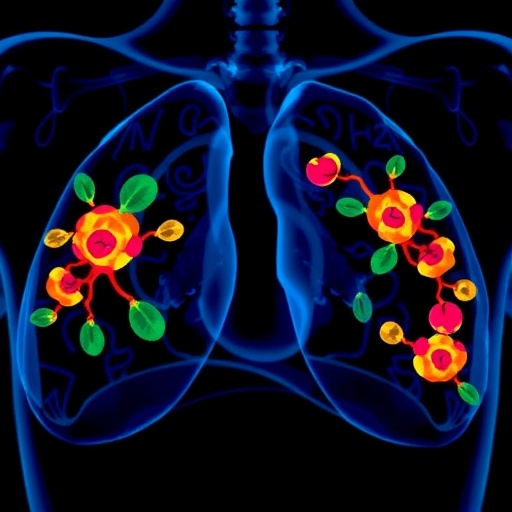In an era when cancer treatments demand innovative approaches, recent findings have illuminated a promising avenue for therapeutic advancement, particularly against breast cancer. Researchers led by Yadav et al. have delved into the multifaceted world of L-mimosine, a natural compound, utilizing network pharmacology and rigorous in vitro investigations to uncover its multifaceted therapeutic potential. This study represents a significant stride in understanding how a single compound may interact dynamically with various biological targets, effectively enhancing its capability to combat one of the most prevalent cancers among women worldwide.
Breast cancer continues to be a leading cause of cancer-related mortality among women, demanding the emergence of new treatment modalities that are both effective and less toxic. Traditional chemotherapy and radiation therapies, while effective, often come with considerable side effects that challenge patient quality of life and compliance. Research teams like Yadav’s are striving to find alternative treatments that not only mitigate these adverse effects but also amplify therapeutic efficacy.
L-mimosine, derived from the leguminous plant Mimosa pudica, has been noted in traditional medicine for its various health benefits. Historically, this compound has been applied in various therapeutic contexts, yet its specific action against cancer has not been as extensively studied. In the endeavor to elucidate its anti-cancer properties, Yadav and colleagues have woven together insights from pharmacology, cellular biology, and computational sciences, setting the stage for breakthroughs in breast cancer treatment.
Core to this study is the application of network pharmacology, a systems approach that allows researchers to consider how compounds interact with multiple molecular targets rather than isolating them to a single receptor. This holistic perspective is particularly relevant for complex diseases like cancer, where multifactorial interactions between pathways often influence therapeutic outcomes. By employing this approach, the research team was able to identify potential targets for L-mimosine, thus providing a more comprehensive understanding of its mechanism of action.
Central to their in vitro investigations, Yadav and co-authors employed various breast cancer cell lines, allowing them to evaluate the compound’s anticancer properties in a controlled laboratory environment. The results from these assays painted a promising picture, revealing that L-mimosine inhibited cell proliferation and induced apoptosis in cancer cells. Notably, the research indicated that the effectiveness of L-mimosine was dose-dependent, suggesting that careful titration could enhance its therapeutic applicability.
The dual approach of combining network pharmacology with in vitro cellular studies established a robust framework for validating the therapeutic potential of L-mimosine. This methodology not only enhanced the credibility of their findings but also underscored the importance of considering both the biological complexity of cancer and the pharmacological intricacies of potential treatments. As the researchers unraveled the signaling pathways influenced by L-mimosine, they discovered its ability to modulate key processes involved in cancer progression and metastasis.
One of the highlights of the study was the revelation of how L-mimosine interacts with several proteins implicated in breast cancer pathophysiology. These interactions pointed to the compound’s ability to affect well-known pathways such as apoptosis, cell cycle regulation, and even angiogenesis. This multifaceted action may position L-mimosine as a formidable candidate in the arsenal against breast cancer, offering hope for patients who are in desperate need of more effective therapies.
As the data amassed began to crystallize, the implications of these findings extended beyond merely understanding L-mimosine’s mechanisms. The combination of traditional pharmacological wisdom and modern computational techniques represents a paradigm shift in drug discovery, illustrating how ancient natural products can be repurposed with the aid of cutting-edge technology. Such an approach not only provides insight into existing compounds but also paves the way for future innovations in cancer treatment.
Moreover, Yadav’s research underscores the critical need for interdisciplinary collaboration in modern science. By engaging biologists, chemists, pharmacologists, and computational scientists, the research team was able to develop a rich, nuanced perspective on L-mimosine’s therapeutic landscape. This synergy exemplifies the essence of translational medicine, where discoveries in the lab can be effectively translated into clinical interventions.
However, Yadav et al. caution that while the results are encouraging, further research is imperative to fully understand the pharmacokinetics and long-term safety of L-mimosine in humans. Clinical trials will be necessary to assess its efficacy in various stages of breast cancer and among diverse patient populations. Such rigorous testing is essential to ensure that L-mimosine can transition from the laboratory bench to the bedside.
In conclusion, the comprehensive network pharmacology and in vitro investigation of L-mimosine represent a significant advancement in the quest for novel breast cancer therapies. The holistic understanding of this compound’s multifaceted action provides a foundation for future research, potentially leading to new treatment options that minimize side effects while maximizing therapeutic outcomes. The work of Yadav et al. not only sheds light on L-mimosine’s potential but also serves as an impetus for ongoing exploration of nature-derived compounds in the fight against cancer.
In an expanse where traditional therapies fall short, the future remains hopeful. As we continue to mine the depths of natural products for therapeutic clues, the resonance of this study illustrates the untapped potential lying within the landscape of botanical medicines and the future they hold in oncology.
Arm-in-arm with innovation and exploration, researchers like Yadav and co. are not merely leading research; they are crafting a narrative filled with promise, resilience, and a relentless pursuit for answers that could one day herald a new era in cancer treatment.
Subject of Research: The potential of L-mimosine against breast cancer through network pharmacology and in vitro studies.
Article Title: Comprehensive Network pharmacology and in vitro investigation of L-mimosine: unveiling multi-targeted therapeutic potential against breast cancer.
Article References: Yadav, J.K., Shah, K., Ghanchi, M. et al. Comprehensive Network pharmacology and in vitro investigation of L-mimosine: unveiling multi-targeted therapeutic potential against breast cancer. BMC Complement Med Ther 25, 318 (2025). https://doi.org/10.1186/s12906-025-04905-y
Image Credits: AI Generated
DOI: 10.1186/s12906-025-04905-y
Keywords: L-mimosine, breast cancer, network pharmacology, in vitro, therapeutic potential, apoptosis, cell proliferation.




